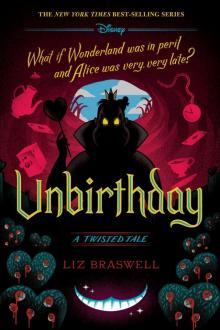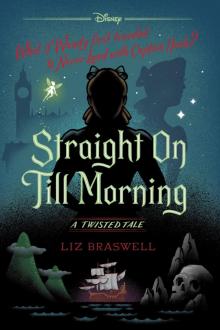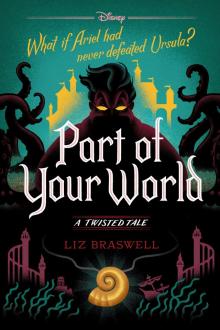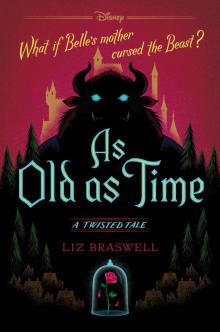- Home
- Liz Braswell
Part of Your World Page 6
Part of Your World Read online
Page 6
In any case, it made Flounder almost choke in laughter.
The guards ran. At first crazily, back and forth, around and around, trying to escape the stinking, terrible hailstorm. The smarter ones immediately made for the shelter of the castle and the cliffs.
“Go!” Flounder said, recovering himself.
With a few quick leaps Ariel porpoised herself into much shallower water. Using all her strength she forced herself upright so she was standing on her tail. Then she waved the trident and became a human.
That was it.
That was all.
Her father could have done it years ago. Long before all the terrible things began.
Before she had even met Eric.
He could have turned her into a human for a day, or several days, and let her explore life on land until she tired of it, or became scared, or grew lonely, or missed him.
Once she had met Eric, Triton could have saved her the trouble of selling her voice and her life—and then his life—for the chance to fall in love with the boy. She would have been able to walk on her own two legs, and say things with her own voice, like “I’m the mermaid who saved you. Yep, I know that song, because I wrote it. Let me sing it for you.”
And she could have sung. And they could have fallen in love.
She and her father could have worked out a deal like the Old Gods: Proserpine and Hades and Ceres. She could spend some of her days on land, the rest of her life in the sea. And then everyone would have been—well, if not deliriously happy, then at least satisfied that it was the best they could all work out.
But…the slightly older Ariel added…who knows what really would have happened? The trident’s power rose and fell with the sea and the moon. She could have stayed human for only a few days a month; a week, maybe two at best. Would that have been enough to sustain a relationship?
Would it have turned out that human princes were just as boring as merprinces?
Ariel dismissed the old familiar thoughts and focused on the matter at hand. She scooped the human clothes out of her bag and dragged them on as best she could. They were thick and coarse, and her now-human skin was tenderer than the scales of a mermaid tail. The shoes, crusted with old barnacles she had to scrape off, would have to wait until they had dried out on land for a while. She shook the trident and it changed, shrinking. Its surface glittered even more golden, as though the metal became more refined the more tightly together it was pushed. Finally it was in the palm of her hand and shaped like a comb. Countless tines replaced the initial three, each with a tiny spike on its tip that minutely replicated the barbs. She admired it for half a moment and then slipped it into her hair, above her right ear, wedging it in place among her intricate braids.
Keeping one eye out for the guards and her hands close to the ground in case she slipped, Ariel clumsily made her way through the shallows to a sheltered part of the lagoon. It was like the first walk of a baby sea turtle in reverse: tentative claws in the sand, a burst of warmth from the sun on her face after incubating in the earth for so long. The dragging, terrified walk to the water. The land and sky full of danger and death, the ocean full of safety and warmth. All this was the same; she was just doing it backward.
It was hard thinking things and keeping track of her feet at the same time. Sand felt. Pressure on the skin of her feet felt. The breeze kept whipping away her breaths in little gasps. Salt, which surrounded her normally, dried in white patches on her skin and stung her lips like acid.
She stumbled, pitching forward.
With the will of a queen, she forced, she ordered her left foot out to stop the fall. Tail muscles recently converted to thighs screamed at the strangeness of the motions.
She paused, taking a breath, knowing her body would recover. It wasn’t as if she were walking on iron blades that cut deep into her soles with every step—though that’s what it felt like for a moment. This was beach sand, always described by humans as soft and inviting. If she fell, it wouldn’t be the end of the world.
The noise of gulls and guards drifted on the wind to her.
“Stupid bird…”
“Get offa me!”
“RUN!”
But as she rounded the edge of the escarpment that began the sheltered area, everything shut off like a spell: the wind, the sting of the wind on her face, the noise of the guards, the constant feel of the air pushing against her skin. Without realizing it consciously, Ariel wound up in the lagoon with the rounded rock that stuck out of the sea where she had first brought Eric, where the water was warm and slow and shallow.
And it was silent.
Ariel slumped down into the sand and let out a sigh that was almost a sob. She took several deep breaths now that she didn’t have to fight the breeze for them. She closed her eyes and tilted her head toward the sun. Years ago her desire to win Eric had been so strong that she had forgotten all the other reasons she wanted to walk on the land: to feel the sand and the warmth of Helios directly on her skin.
It was just as amazing as she had always imagined it.
But Ariel was spending too much time caught between sea and land in the little lagoon. She was there to find her father, not enjoy herself.
“I followed your footprints,” came a voice from above.
Ariel turned and watched the seagull execute a delicate landing on the stone with such precise control her feet touched the surface just as she slowed to a stop.
“Think of that,” Jona said. “I followed a mermaid’s footprints in the sand. That should be part of an epic poem. Or a book. Or something.”
Ariel raised an eyebrow at the gull.
“It’s something that shouldn’t exist,” the gull went on, explaining helpfully.
Ariel rolled her eyes. I get it. I’m not stupid.
Flounder popped his head out of the water. “Wow, that was amazing. It went right according to plan!”
Scuttle landed heavily on the stone next to his great-grandgull, more like a bomb of feathers than a professional flier.
“You bet your gills it did!” Scuttle crowed. “You shoulda seen them. They ran like we were the plague! Like we were terrifying multiarmed giants! Like we were—”
“Gulls making a mess everywhere,” Flounder finished.
“Well, you say potato,” Scuttle sniffed.
If you’re all done, Ariel signed, I think I have a castle to get to.
“The queen thinks it’s time to go,” Flounder said.
“Phase two, I gotcha,” Scuttle said, winking.
“You’ll…you’ll keep an eye on her, right?” Flounder asked softly.
“Aw, you bet we will,” Scuttle promised. “She’s like family. We’ll watch over her like hawks. No, not like hawks. They’re too snooty. Like albatrosses. No, they’re so difficult. Like…lions!”
“We’ll make sure one of us has an eye on her at all times,” Jona translated.
“But right now”—the old gull wheezed a little—“I may take a breather, you know? These bones ache more than they used to. The kid here can take care of things for a bit. I’d trust her with my life.”
In answer, Ariel scruffed him under the chin and kissed him on the beak.
She then turned to both gulls and bowed, clasping her hands together.
Thank you both for everything.
Scuttle tried to imitate the gesture. It came off as far less impressive, but was twice as endearing. Jona cocked her head and regarded him with a glittering right eye: if Ariel had to guess, she would have said that the younger bird was smiling, perhaps fondly, at her great-grandfather.
“Good luck. We’ll be up above,” the gull said, and waited for just the right wind to sweep her like a kite up into the sky, slowly and methodically. Scuttle flapped hard and took off like a shot.
“Be careful. Please, Ariel,” Flounder begged, sounding like the old Flounder.
Ariel gave him a smile.
Then she made her way to the castle.
She decided to avoid the stone
staircase that led directly from the beach into the castle; that was for the enjoyment of the prince and his household only. She remembered joyfully racing down its steps to the sunset beach, then belatedly noticing maids and footmen carefully skirting the edge and going around to the back of the complex.
She followed her memory, circling around the north side of the castle. Right before the wet, compact sand petered out into a lush estuary, the well-trodden path of the commoners who worked in the castle became visible. Hidden from the amazing views and picturesque scenery of the bay, scullery maids scoured out pots with rags and the bristly stalks of local horsetail plants. Housekeepers beat carpets draped on the stunted, hearty little bushes and pines that lived too close to the salt water that was life to the sea and poison to the land. Scullery maids and boys dumped baskets of garbage onto a growing midden.
Right there.
In the middle of the rich, clean water that fed and drained the shellfish nursery, where seashore birds made their nests, where eels and elvers and minnows made their lives.
Ew.
There was no formal sign for that.
Ariel wrinkled her nose and turned away.
As she passed more servants and messengers and peddlers and couriers, she wondered if anyone would recognize the mute girl from years before. She hadn’t aged the way humans did. Her face did look different, but was it different enough? Her hair was tightly bound against her head. She wasn’t wearing the pretty blue dress with its fitted bodice and was definitely missing the giant, floppy, pretty-as-a-picture bow the maid Carlotta had put in her hair.
Was she imagining it, or were people looking sideways at her? Were they trying to take her in without seeming to stare? Did they notice her? Was she just being paranoid?
She didn’t have a plan if someone stopped her. She had nothing more to go on than sneak into the castle and find her father. Either she had enough confidence as queen that she felt she could deal with whatever was thrown at her, or she literally had no way to plan for the unexpected and so didn’t. Probably the latter, she thought with a sigh. Still the same old Ariel, swimming in where sharks feared to paddle.
On the other hand, I could always return to the other plan—calling up the waves to more forcibly rescue Father….
She held her breath at the main gate, but none of the guards looked at her twice.
None of the guards.
She looked around, suddenly realizing what should have been obvious if she hadn’t been so nervous: there were many, many more guards than when she had last been there. Here, in the castle, not at the beach where they once were. And not just guards, either; there were real soldiers patrolling the halls. Men and boys in keen military dress, shined boots, shined buttons, sabers hanging from their sides and caps cockily perched on their heads.
There were other people, too. Richly clad men and women walked in slow, carefully paced pairs and trios, talking in low voices, checking fancy pocket watches, smiling to other pairs and trios they passed with smiles that disappeared immediately after. Men in poufy shirts with questionable expressions, dour and shifty. Women in bustles and long-flowing gowns that trailed behind them like jellyfish tendrils, looking at each other shyly from behind fans or boldly from under giant hats.
Someone almost crashed into Ariel, pushing a small wagon with an open trunk loaded up on it. Laid carefully over sawdust and packing on the top were—guns. She remembered seeing the castle guards carry them, present them, occasionally shoot them. Muskets with cruel bayonets, shining and black and freshly oiled.
While she was staring, Ariel was knocked from behind by a self-important man with florid cheeks and weak eyes. He strode past her without apologizing and was followed by a servant carrying what looked very much like a small chest of gold.
What is going on here?
Tirulia was a sleepy little kingdom, and this seaside castle was the unofficial capital of its most carefree, bucolic quarter. Eric had no real duties. His parents were still alive and actively ruling—at least they had been the last time she was here. He had no particular desire to take over as king. He had a real desire to sail. He was young, he was enthusiastic, he loved music and the sea and wind in his hair. Everything that she loved, too, but flipped to its Dry World version.
This castle no longer felt like him. It felt…foreign.
Confused, Ariel tried to reorient herself and keep walking, undistracted by what was apparently the new normal.
When a washerwoman walked by, unable to see directly in front of her because of the pile of freshly dried linens blossoming like an anemone out of the basket she carried, Ariel swiped a couple from the top. She carried them in front of her as importantly as if they were a chest of gold, and no one even glanced at her.
I’m becoming as tricky as a human. So quickly! She thought with light irony as she marched into the next room…
…and then immediately hid behind a cabinet.
Standing there stiffly, giving a footman the sort of quiet, gentle-but-severe dressing down that could be done only by the Bretlanders, was Grimsby—Eric’s manservant and closest confidant.
Much like a mermaid, he hadn’t aged at all since the last time she had seen him. But perhaps that was because he had already been old when they first met and didn’t have that many more changes to make before his final transmogrification. His light blue eyes did seem a little wearier—also like her own.
He finished with the footman, sending him off red-faced and chagrined, then headed with slow, solid steps down the hall. The energy of this new castle swirled around him; servants, visiting nobles’ servants, the visiting nobles themselves, the men and women with the money…and though he was a true Bretlandian butler who rarely let his feelings show, Ariel watched him trying not to disapprove of it all with his clear and tired eyes. He moved like a shepherd of comb jellies, trying to urge them through a foreign school of quick-swimming minnows, neither affected nor scared by them, only vaguely concerned.
Ariel found herself holding the skirts of her dress tightly, almost like a timid girl.
She wished she could go to him. In his own way, Grimsby had been extraordinarily kind to her in her short time on land. Gently guiding when she did the wrong thing, leading silently by example rather than chastising aloud.
She wanted to grab him, to pull him aside and find out what was wrong. Why did he seem upset? What had changed? Did it have to do with all the activity in the castle?
But…even if she did manage to get him alone…they couldn’t talk.
She couldn’t talk.
And she highly doubted he could understand a sign language based on an ancient and, to him, foreign language.
She watched Grimsby go, his exit immediately camouflaged by skirts and jackets, scurrying and bustling, and felt something tighten within her. They could have meant something to each other, had things worked out differently.
She took a deep breath, willing the knot in her heart to go away.
The Queen of the Sea had a mission. She had come to find her father. Anything else she would deal with later, if at all. For now, she had to figure out where her father was being kept.
Think logically, she reminded herself. The gulls had told her that they’d seen Ursula getting dressed, primping, while talking with Triton. With a feeling of nausea she faced the obvious: as Vanessa, the sea witch was married to Eric. The two would either be sharing the same room or adjoining apartments in the royal tower. Ariel knew where that was.
She straightened up, held her linens out, and marched forward, trying to set her face into the blank stare of a maid. It was easier than it would have been the first time she had come on land, when she had no cause to do anything aside from stare around with wide eyes, drinking in the strange world and its goings-on. She had never even considered trying to blend in before; there was no strange or different in the world of the mer. It never occurred to her that people would notice or not like her if she stuck out and acted odd.
She brushed aside
this slow-moving slipper shell of a thought to another corner of her mind, and wondered if there was a possibility of catching another glimpse of Eric.
The stairs were a little tricky—“up” was a strange movement for her still-new legs and feet—and she made it as far as the first hallway before she was discovered.
“Hey, you! Who are you? You’re not supposed to be upstairs!”
It wasn’t one of the now-multitudinous soldiers; it was a rather pretty but shark-eyed maid. Ariel didn’t react; she just stood there, unsure what to do. She couldn’t even make up an excuse for being there—or at least make it be understood.
The maid grabbed a passing guard. He didn’t seem to have any interest in either one of them and tried to continue his rounds, but the maid sort of shook him at Ariel.
“Hey! She’s not supposed to be up here. She could be a spy!”
The guard grunted in displeasure but started toward Ariel.
The Queen of the Sea dropped her laundry and ran.
Ariel wondered vaguely how her new legs would react to this new situation.
Just fine, apparently.
She ducked between footmen, dodged through couples, threw herself around corners. There was a second stairway she remembered, toward the back of the residency tower, which the chambermaids used. The one she probably should have chosen to begin with. She put a hand out to the sandstone wall to steady herself as she began her first descent with new legs. The firmness and familiarity of the rock gave her courage. She urged her feet down the steps like ceremonial dolphins pulling her golden chariot in a circuit race.
“Halt!” came a voice from behind her—along with the sound of polished boots striking stone.
Ariel panicked and practically fell onto the landing. She wasted a moment trying to decide whether to continue down another narrow flight to the sub-basement where the wine cellars were, along with another exit to the outside. But that was probably what the soldiers expected her to do.

 Unbirthday
Unbirthday Straight On Till Morning
Straight On Till Morning A Whole New World
A Whole New World Once Upon a Dream
Once Upon a Dream Part of Your World
Part of Your World Nine Lives of Chloe King
Nine Lives of Chloe King The Fallen
The Fallen As Old As Time: A Twisted Tale (Twisted Tale, A)
As Old As Time: A Twisted Tale (Twisted Tale, A)